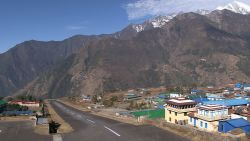Story highlights
Anthony Bourdain returns to the Philippines with a personal mission
He looks at the kindness overseas Filipino workers have spread around the globe
Tagalog, the language of the Philippines, is not an uncommon thing to hear in my household. Like many children all over the world, my daughter arrived home from the hospital to find a Filipino baby nurse.
Vangie was with her from the very beginning of her life, and in time, my daughter came to know her son, her daughter-in law, their kid – and in time, an extended family and friends – in New Jersey, Southern California and the Bay Area. And of course, most importantly, Jacques, Vangie’s grandson, her best friend, from whom she has been inseparable since infancy – her older brother in every way but biological. Partners in crime.
If I go back through old photos today, at least half will be of the two of them together.
Thanksgiving, Christmas, New Years, vacations and birthdays are celebrated together, our families in and out of each others’ homes interchangeably. So, I have noticed some things, some features of Filipino daily life that I thought worth investigating.
There’s always singing, for instance. Everybody seems to sing – an affinity passed on to my daughter. Family – and church, of course, loom large (even in my otherwise atheistic household). And food.
My daughter is no stranger to sisig and sinigang and adobo and holds me in disregard for being unable to procure her the delicious Filipino pastries and breads she finds at her other family’s home. She knows a few phrases in Tagalog and looks at me pityingly when I don’t know what she’s talking about.
Nothing goes to waste around here. Anything, no matter how small, that could be of use to anyone who might need it back home, gets packed in a big box and sent to the other side of the world – if not to family members, to someone in need.
Why do Filipinos care so much?
Exploring Manila
So, that’s what this episode is really about. It’s NOT about the Philippines. How could it be? There are over 7,000 islands in the Philippine archipelago and I’m pretty sure I’ll die ignorant of most of them. It’s not even about Filipinos – as my experience, however intimate, is limited in the extreme. And, as it turned out, our plans to explore beyond Manila were foiled by typhoon.
This episode is an attempt to address the question of why so many Filipinos are so damn caring. Why they care so much – for each other – for strangers. Because my experience is far from unusual. Hundreds of thousands – maybe millions – of children have been raised by Filipino nannies. Usually mothers of their own children who they were forced to leave behind in the Philippines.
Doctors, nurses, housekeepers, babysitters, in so many cases, people who you’d call “caregivers” but who, in every case I’ve ever heard of, actually care. Where does this kindness, this instinct for … charity come from?
For sure, to go abroad and look after others is a huge part of the Philippine economy. Overseas workers account for an enormous and vital part of the lives of those who remain. The government cannot be counted on to take care of its people – and Filipinos often have had to get really good at a do-it-yourself way of getting by, and hopefully, rising up.
You see that attitude everywhere in Manila – in the makeshift Jeepneys that shuttle people to work and back, to the cobbled together homes in the poorer districts. Hammered together scrap wood but swept, kept clean, decorated with flowers or holiday decorations.
It’s personal
Not everyone in the Philippines, I should stress, has such limited options. But it is the overseas worker and those they have had to leave behind who interest me most this episode. I guess you could say it’s personal.
You will meet, in this episode, one woman – only one (and there are many, many like her) – who, in her 30 years abroad, separated from her children, raised DOZENS of people up, sent them to school, helped to improve their lives, built homes – before finally returning, her kids now middle aged. It is an astounding story and not at all an unusual one.
There was one other bit of business I had to investigate.
For years now, in hotel bars in Chiang Mai, in lobbies in Singapore, cocktail lounges in Colombo and Kuala Lumpur and Hong Kong, wherever I go, I find a Filipino cover band able, on request, to play “Dark Side of the Moon” note for note – before moving on to Happy Birthday (in English, German or Cantonese), Patsy Cline, Celine Dion – and then “Welcome to the Jungle.”
I had to know more. Where do they all come from? I hope the overseas Filipinos and our fans in the Philippines like this episode more than they liked the last one on our other show. This is certainly not the definitive show on the Philippines – and it will not be our last show there.
I imagine this time around there will be tears. At least I hope so. We tried to do right by people who’ve been very, very good to us.





























